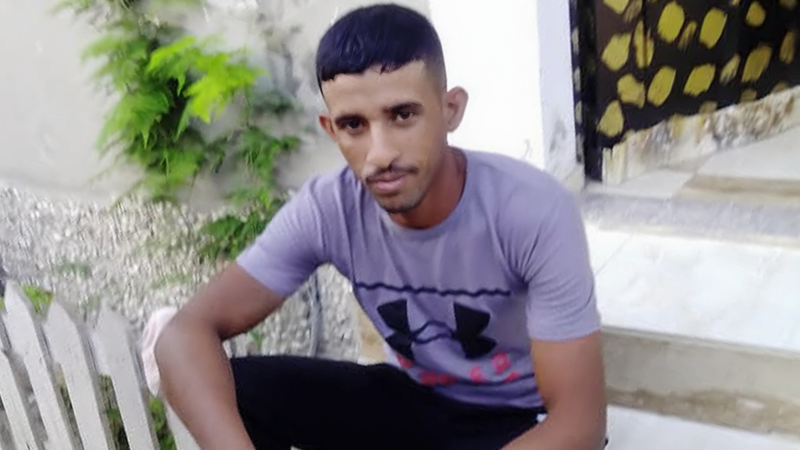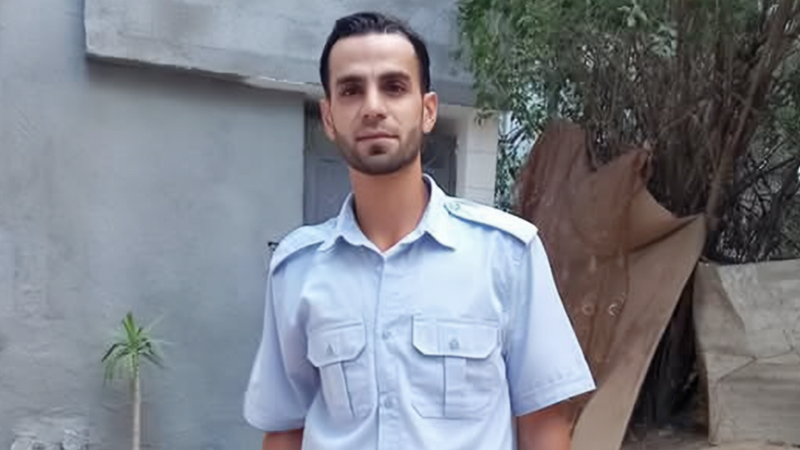The Electronic Intifada 10 March 2025

Israel killed Ahmad El-Mbayed as he searched for firewood. (Photo courtesy of family)
Surviving in Gaza’s ravaged terrain is a daily fight for many families ripped apart by famine and genocide, even after the ceasefire came into effect on 19 January. My cousins Ibrahim, Amin and Ahmad joined me in putting everything on the line – even our lives – to support our loved ones.
We all lived in the shattered remains of Shujaiya, a neighborhood that used to be full of olive groves and other trees. Now, torn from the ground by the forces that destroyed our home, these trees today serve as nothing more than firewood, a vital source of income for some of those still alive.
After Israeli forces obliterated the neighborhood, residents still there were left to collect what little remained. Trees that once symbolized the land became a means of survival.
Ibrahim has a been constant presence in my life for years. Our bond was strong before the Israeli genocide, but over the past year, it deepened even further.
I know everything about his plans and intentions, including asking his martyred brother’s wife to marry him. At 28, he is now the sole financial provider for her children and for his elderly father.
The weight of responsibility was crushing, he once told me, but Ibrahim had no choice but to keep going for the sake of the family. He searched for firewood, for olives, for anything he could sell to keep his family fed and warm.
Reflecting on our bond, Ibrahim told me, “We are a group of risk-takers, unafraid of occupation or death. The only thing that matters to us is surviving the day and finding ways to help our helpless, hungry and cold family members. We always ask ourselves, ‘How can we meet their needs?’”
For Ibrahim, answering that question has been a daily battle and pulse of his existence.
“Every day, I put my life at risk just to put something on the table, to earn a little cash so my children won’t feel the cold anymore,” he said. “Taking full responsibility for those kids and my elderly father is an overwhelming burden, one I wish I didn’t have to bear.”
Despite it all, Ibrahim has pressed on through the unthinkable horrors of the Israeli attacks. He cried when he told me about the devastating loss of Amin and Ahmad.
“Last November, we lost our very dear cousin Amin. This January, we were heartbroken to lose my other beloved cousin Ahmad,” he said, his voice trembling.
“It’s hard to accept that we couldn’t save them. All we could do was bring back their bodies. Surviving the artillery shells that rained down on us still feels unreal.”
Ibrahim closed his eyes and said, “I pray to God endlessly for an end to this brutality and suffering. When this horror is over, I hope that everyone will be able to live freely and safely, just like everyone else in the world.”
Ahmad, the provider
For Ahmad Salah El-Mbayed, the struggle to provide for his family was just as perilous. At 33, having already lost his father in 2021 to abdominal cancer, he took on the responsibility of caring for his five sisters, two brothers and his mother.
It became his duty to support and serve his family in his father’s absence.
Every day, he risked everything to gather firewood. The basics were hard to come by in Gaza’s desperate conditions.
Yet Ahmad never hesitated.
No matter the danger, he would do whatever it took to make sure his family would survive another day.
The second day of January this year was different. That morning, Ahmad, like many others, ventured out early to collect firewood near the eastern edge of Gaza City.
His wife, Jasmine, later told me about a “terrible feeling” she had that day and he begged Ahmad to stay home.
But he reassured her, promising to return with something sweet for her and their children.
However, Ahmad never came back home again.
As he scavenged for firewood near the ruins of his home, an Israeli drone struck. That bloody explosion silenced a man who had seemingly happily risked everything for the sake of the people he loved the most.
I could feel the weight of that loss in my bones.
Through hardships, joyous occasions and everything in between, Ahmad and I had stood by each other, easing life’s worries and grief. We chased after aid parachutes falling from the sky together and waited for the aid trucks on al-Rashid street and the al-Kuwait roundabout.
A dish left unmade
Amin was also the provider for his family during a time of extreme poverty and widespread famine.
He once told me about his siblings’ longing for the fresh vegetables, fruit, chocolate and other simple items they saw in crowded markets but could not afford.
He had often mentioned how much it pained him to know of their yearning, so he took it upon himself to try to buy them various items wherever he had enough money to do so.
He put himself in danger of being killed or captured by the Israeli military for more than a year whenever he gathered firewood and olives to later sell.
I still vividly recall Amin telling me just moments before he was killed that one of his younger sisters had told their mother that she wanted maqluba – stewed meat, fried vegetables and rice.
Amin, ever the doting brother, said he pretended not to hear. But later, despite his pretended indifference, he walked up to her, wrapped her in a warm embrace, kissed her gently on the cheek, and said, “God willing, I’ll bring all the ingredients for Mom to cook you that delicious meal.”

Amin wanted his sister to have a good meal. (Photo courtesy of family)
Together, Ibrahim, Ahmad and Amin went to collect olives from fields abandoned by their owners or government-owned ones. They had the courage to try to do the impossible in order to help their families survive another devastating day.
They smiled and chatted while remembering previous harvests, according to Ibrahim’s recollections of that day. They let themselves experience a moment of normalcy.
In spite of the never-ending struggles, they wanted to return with enough olives to put food on the table.
After the others and I heard an explosion very close to where they were harvesting olives, Ibrahim and Ahmad kept shouting for help, saying that Amin had been killed. We heard them even though they were some distance away from us, but because the neighborhood had been mostly bulldozed and was empty, it felt like a ghost town, with only a few of us still living there.
After carrying Amin’s lifeless body to the hospital, we sat in mourning for three days.
That evening, the maqluba Amin had promised was left unmade. His siblings were left to mourn a brother who sacrificed his life for their happiness.
Even though I am still mourning my cousins, their stories are mine, too. We fought together, we struggled together, and we gave everything we had for the ones we loved.
Our stories serve as potent reminders of the human spirit’s resilience in the face of unspeakable adversity. Our tenacity and selflessness will never be forgotten, even in a world that far too often ignores our endless suffering.
Yusuf El-Mobayed is a freelance writer and reporter who collaborates with charity organizations in Gaza.


